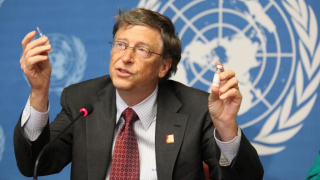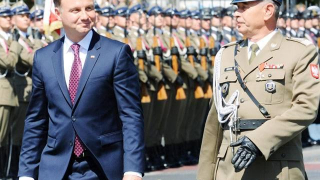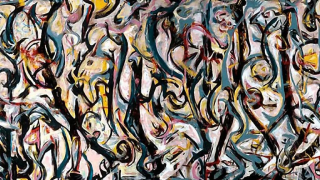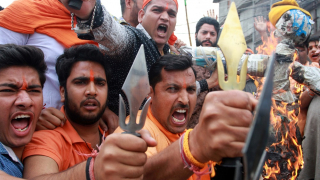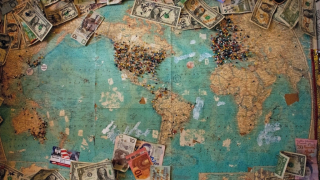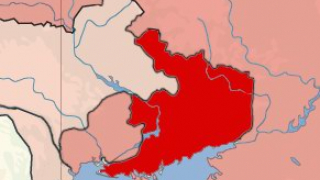For Olga
15.08.2017
When I was born 42 years ago, the nationalist factor seemed to lose its importance in the face of the geopolitical competition between the two blocks in a practical dimension and even stronger emphasis on human rights issues in the propaganda and ideological sphere. Today my 11-year-old daughter lives in a world which can end (as we know it) in process or unit collapse being a result of the escalation of conflicts provoked and sustained on the basis of aggressive nationalism (in the Polish scientific/political discourse - chauvinism). Considering the threats to security and international order associated with this phenomenon - we must first of all come to its origin and the purposes for which it is used.
On the road to total control
As most of the historians and political scientists agree - nationalism appeared as an idea and political project after the French Revolution, when the vertical stratification of societies disappeared and the hierarchical ruler-subject system was crushed together with horizontal social structure based on estates of the realm distinctiveness and privileges (and in previous times also some aspects of sovereignty which traditionally belonged to the social groups, guilds and even personalities).
A new binder was needed to establish and maintain an effective government, primarily aimed at one goal - the conduct of universal wars, on a mass scale unknown to the present. Nationalisms have changed the rivalry of the powers, replacing "political wars", which were essentially only a technical complement to diplomacy - by the clashes of nations for world domination over time with a result of total extermination of whole nations. The nationalist government (even if it is called democratic, radical, liberal or even socialist) will inevitably aim at total control over society - "the Nation" and then at the same time to dominate the geopolitical environment. And it is really hard to say which of these two aspirations is the result, and which is the cause and how much one facilitates the other. We are dealing with the inevitable and self-supporting feedback, observed in its fullest form during the Great War, in historiography unjustly portrayed as two separate World conflicts.
The nationalist project, as a child of the revolution, was an anti-traditionalist, and considered as the most serious enemy in competition for global leadership universal monarchies and great ethnoses, of which a very special and exemplary Russian Ethnos was, and still remains, based on absorption by the developing center the new groups and minorities, while maintaining common, basic and universal values built on the ground of religion, family, family, language group, place of residence, or dominant economic type.
Although the western World has failed to work out a model even close to the development path of the Russian Empire, the result of the nationalist outbreak in 1914 was the disruption of the Russian Ethnos path and the demise of the last remittances of the Western Civitas Christiana. However, national states built as a result of the First World War, could not be - and as it turned out, they were not – anything but just a step in the construction of a New World Order. This proved by "completing World War" until 1945, and then the emergence and gradual implementation of integration and globalization tendencies in the modern World, which only seemingly (to what extent) deny the fundamental theses and ideals of nationalism.
"We vs. Aliens"
It would be difficult to recognize as an accident that another burst of nationalist emotion occurred at the end of the bipolar rivalry, as if sealing its victorious for the West ending. Two dramatic, tragic and fatal events: the Yugoslav Wars and the collapse of the Soviet Union, were based on the nationalist paradigm and recalled for the needs of these conflicts: "the right of nations to self-determination". What is very characteristic - a nationalist factor appeared in the East, whereas in the West, subjected to European integration and globalization - remained a cursed and (until last time) denied. The national element, based on the division and creation of the threat of "We versus Aliens" remains a key to the political organization of the West-East border, becoming part of the national ideology of states such as Lithuania, Latvia and Estonia, and now also Ukraine and partly Moldova. It has also been permanently incorporated (although not named) into the propaganda of Poland or Romania, but it is always about raising anti-Russian nationalism, anti-Russian emotions and against the possibility of rebuilding the cooperation of states and societies of this part of the World.
Such mechanisms operate in almost all post-Soviet and former Eastern bloc countries, but in no way appear to be an obvious and natural consequence of shaping the national and state identity of these nations. It is popular but not true point of view, that "a small nation must be aggressively nationalistic". Let's take for example, the Scots, a nation with an ever stronger and modernly formed national idea, at the same time based on identity and completely open, devoid of chauvinism or intolerance. So maybe nationalism is attached to our place on the map? Also not, as it is demonstrated by the policy of Belarus, a friendly country, safe and peaceful, determined in the pursuit of its own interests, but again - without even the slightest hostility either against ethnic groups living in its territory or neighbors. In this context, it is more evident that neither Ukrainian nor Lithuanian nationalism is anything but a "historical necessity". Even more, without any evidence other than logical reasoning - but both of these ideologies and social movements seem to be the result of external, long-lasting and, unfortunately, effective imprinting.
Nationalism needed ... "- but for whom?
Evidences, anyway, exist. In May 2014, Ann Applebaum, an influential American journalist and wife of the then Polish foreign minister, was rightly credited with expressing America's national ideology and propaganda: "Ukraine needs nationalism!" And she knew well, writing less than two weeks after the burnt-out at the Odessa House of Commons - that she was talking about criminally, banderists version of nationalism! This is the essence of this political plan - nationalism is supposed to be instrument in achieving the geopolitical dominance of the West over the East, deconstructed, devastated, divided by national emotions.
When we see the Nazi marches in Odessa, Kiev - but also in Riga and Kaunas, we observe the realization of such a scenario, because after all, with swastikas on the shoulders no one can walk today in Brussels or Strasbourg,. And here, in the East - yes, the West allows, encourages and finances ...
In parallel, however, a complementary scenario is implemented. Here are some forms of alleged "rebirth of national ideas" also appear in Western European countries. It is no accident, however, that almost everywhere (including the United States itself) they are relegated, targeting only on one topic - the immigrant issue. The emergence of the overwhelming wave of refugees at the gate of Europe took over the West when it was hit by a powerful economic crisis triggered by decades of almost unrestrained liberalism and capitalism. It is characteristic that in the last decades, a powerful propaganda and educational machine almost eradicated the elements of the resistance against e.g artificial sexual differentiation but a sense of ethnic and cultural difference was left – weak but still existed although in the liberal-democrat conditions also this instinct was relatively easy to annihilate. Just like the password in the brainwashed minds - exclamation "Aliens! Enemy! Kill!" can now be used as an instrument of power, a tool for dividing society and directing its attention to ways interesting for a ruling group.
Birth of the nation
Contemporary ethno-nationalism appears as a double-effective instrument - straightforward against geopolitical opponents and catalyzing dissatisfaction with the economic backing of its own subjects. But isn't it a paradox that, in effect, only globalist tendencies are reinforced? No, if we get away for a moment from the historical perspective and reflect on what process we are in fact looking at. So the fundamental and dominant in ethnogenesis is that not a nation creates a state, but a state creates a nation.
We are the witnesses of the emergence of a European state (European Union), in connection with the processes leading to the emergence and full organization of the World State - together with the process of nation formation. A new (?) Global political nation, that is to play a role of power over the other "old type” nations. It is only when we aware of what we are witnessing we will be able to see the present excesses of ethno-nationalism in the correct context and put them into a logical whole.
It is expected of us (or rather we would like ourselves to have such knowledge and skill) to formulate the program of counteracting and defending. Well, in my activities and publications I do not hide a rather pessimistic look at the future. It is hard for me to imagine that the third part of the Great War that is currently in dispersion will not ultimately go through a full-scale, totalitarian conflict, even before a symbolic but significant date of 2050e, the expected year/decade of the final meltdown of the liberal system and global economy advantage reached by the so-called. New Growing Powers. Some hope in this perspective has been given by the effective defense of the great Russian Ethnos against any attempts to impose it on ethno- nationalism as the third method of self-destruction after "democratization" and "liberalism." If Russia choose a nationalist way, so furiously tempting with smooth sentences such as "we have to define who the Russians are, since all our neighbors and even some members of our ethnicity has already gained own identity" – that could be end of the chances for building a stable, multipolar and based on identity World Order . That is why I sincerely wish our Russian brothers to protect themselves and all of us from this dangers. Russia must arise , like its most famous war song said!
We have to survive
As far as smaller countries and nations (such as mine...) concerned but not only for them only- maintaining our distinctiveness, sense of national dignity and other traditional values - we also need to wake up. Wake up - to survive. E.g. Poland needs, for our own interest, broad and deepened regional cooperation, protected by a stable multi-polar international order. Meanwhile - on a smaller scale than in Ukraine or Lithuania - but Poles are also motivated by ground-based chauvinistic emotions, based on targeted aggression, sense of danger, hatred and contempt. My own nationals instinctively fill the false and evil source of these whispers, but the propaganda pressure, in the absence of its own authority, is progressing - and thus the danger of ultimate annihilation in the course of global conflict becomes as real as possible.
The most important thing is becoming educational work, information and exchange of thoughts. Of course the authorities of the modern World, also in our own countries would prefer to separate us, to stop cooperation, to close the borders again which supposedly no longer exist! And that's what they can not afford. Just for my 11-year-old daughter Olga and her peers to still have a world to live in.



